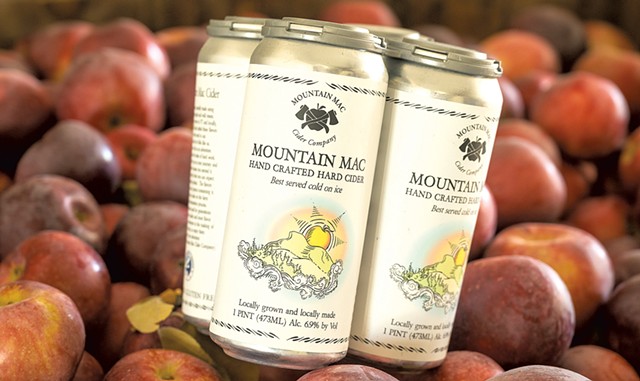
- Caleb Kenna
- Mountain Mac hard cider
In fall 2016, when Conor McManus started experimenting with hard cider, his trial batches took over the 1850s Fairfax farmhouse he and his wife, Leah, had bought earlier that year.
McManus, now 42, worked in construction management at the time. He was ready for a career change and had planned to farm hops to feed the voracious appetite of craft brewers for local ingredients. "I like being around trees and plants, being outside, and working with my hands," he said.
He had begun growing hops while he and Leah lived in the Midwest, but his 35 potted vines did not survive the move back to the couple's native New England. McManus noticed that his new homestead had a few old apple trees. He started grinding apples in a blender and using a tabletop cider press to make sweet cider. "The kitchen was always a sticky mess," he said ruefully.
McManus would pour the unpasteurized cider into clean containers and let the wild yeasts present on the apple skins do their thing: eat the sugar in the cider, producing the alcohol and carbon dioxide that turn sweet cider into hard cider.
As his experiments scaled up, "I bought half-gallon growlers a box at a time. That's all I could afford," McManus said. The novice cidermaker tried mixing different apples, fermenting at varied temperatures and adding some commercial, lab-cultivated yeasts. "I burned out three blenders," he said. "I drove my wife crazy with a couple hundred growlers all around the house."
Countless growlers and five years later, McManus shipped his first cans of Mountain Mac Cider in June. With the distribution support of Craft Beer Guild of Vermont, his cider is now sold at retail stores throughout the state. In early November, the first kegs landed at a few restaurants and bars, including Ken's Pizza and Pub in Burlington and the Worthy Vermont group's three restaurants: Worthy Burger in South Royalton, Worthy Burger Too in Waitsfield and Worthy Kitchen in Woodstock.
McManus is currently fermenting and canning under the alcohol production license of Groennfell Meadery in St. Albans, but he is on track to set up his own hard cidery at Middlebury's Happy Valley Orchard by the end of this year. He's working with the owners, Stan and Mary Pratt, to finalize an agreement that will eventually allow him to buy the 17-acre orchard, retail store, and cidermaking and storage facilities.
Stan Pratt, 68, took a break from making cider doughnuts on October 29 to confirm negotiations with McManus. "I knew it had to be a hardworking person," Pratt said. "It seems like his ideas for the orchard and its future are what I would imagine."
While the details are being hammered out, McManus is using the Pratts' huge press this fall to process 500,000 pounds of fruit sourced from a handful of orchards within a 100-mile radius, plus about 3,000 pounds of foraged apples. The resulting sweet cider will become more than 35,000 gallons of Mountain Mac hard cider, a seven-fold leap over the company's first year of commercial production.
Such large-scale production is monumental for McManus, among the newest of Vermont's roughly two dozen hard cider makers — but a microscopic drop in the North American hard cider market. According to Market Data Forecast, the sector is projected to grow an estimated 10 percent per year to reach about $4.7 billion by 2026, thanks to continued strong demand for gluten-free beverages and lower-alcohol drinks.
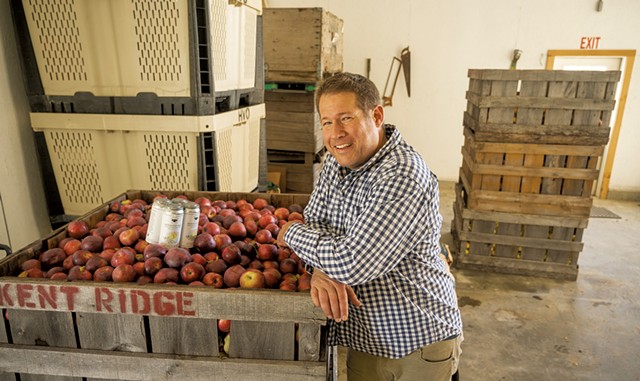
- Caleb Kenna
- Conor McManus with his Mountain Mac hard cider
Conor Giard, market manager for Craft Beer Guild, said the specialty beverage distributor gets pitches from new companies all the time and takes on relatively few. After a few sips of Mountain Mac, Giard said, McManus had his attention.
"There's a lot of [hard] cider out there that's really sweet, but if you take out all the sweet, the really dry ciders are really tart," Giard said. Mountain Mac "is just perfectly in the middle. I think it's what most people want when they say they want a dry cider. It just walks the line really well: drinkable but also complex and a little funky."
McManus also stood out as an individual. "It's not often you get people as passionate and knowledgeable as him," Giard said. "He's talking about grafting trees himself."
McManus grew up in southern New Hampshire, and both his parents were foresters. "They taught me about trees," he said, including how to graft living twigs from one apple tree onto another to propagate promising varieties. His mother owns an orchard that dates back to the 1680s, from which he has sourced some grafts.
At the Fairfax farmhouse, the couple have a menagerie of pigs, chickens, geese and goats. McManus tends 450 young apple trees and an acre and a half of raspberries, blackberries and black raspberries. Manure from the livestock feeds the berries and orchard. The animals, in turn, enjoy meals of apple pulp throughout the fall and winter.
More than a decade ago, McManus was working in management for a huge construction company in a windowless cubicle on the 18th story of its New Haven, Conn., headquarters when he realized that he needed a radical change. "I just wanted to get out of the office," he said.
But it took McManus several years to feel that he could walk away from a steady paycheck for the risks of entrepreneurship. "Rich, I guess, is all a perspective," McManus said. "If you're able to do something you enjoy, be around people that you like, doing something that you want to do, that's richness in itself."
McManus has funded the project so far with the couple's savings. He estimates that over five years, he has spent around $250,000 on everything from transporting apples to boxes and labels. He owns three presses and a canning line he's never used.
When he told Groennfell Meadery's Kelly and Ricky Klein of his plans to use the labor-intensive, hand-powered line for his first cans, "They were like, 'No, no. You cannot do that,'" McManus recalled. He had befriended the Kleins at a small business conference. They offered to let him use their facility until he found one of his own.
Last year, when the pandemic delayed the launch of Mountain Mac for seven months, cash was especially tight. McManus had bought apples from the fall harvest and was counting on income starting in November 2020 to pay the orchards. "I ended up not having enough money to buy heating oil for our house," McManus admitted.
When challenges arise, McManus credits his 16 years in the Vermont Air National Guard — he joined in college — with helping him keep things in perspective.
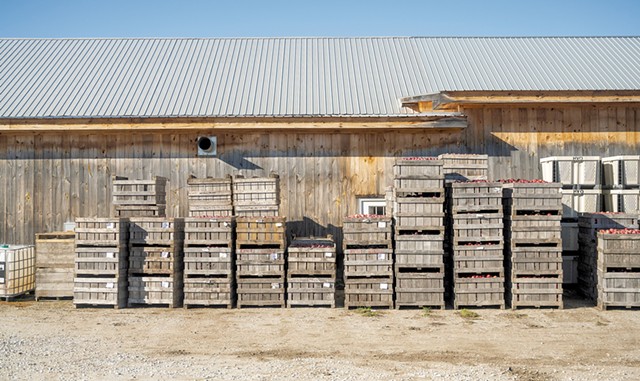
- Caleb Kenna
- Happy Valley Orchard in Middlebury, where apples are pressed for Mountain Mac cider
In 2013, McManus was deployed to Afghanistan for a six-month tour as a civil engineer. "You see up close and personal how hard things can really be and how lucky we are here..." he said. "There are all kinds of things that we take for granted: a toothbrush, running water, fresh fruit." He donates a portion of Mountain Mac revenue to a project that supports pet ownership for veterans.
McManus has learned a lot about cidermaking since his early, sticky kitchen days. One of the first things he realized was that delicious, freshly pressed cider is not necessarily what makes good hard cider. Case in point: the first batch of sweet cider from the old farmhouse trees. "Man, it tasted awful, so tart and sour," he recalled, "like that wild apple you bite into and just want to spit right out."
But after fermenting for a winter, the resulting hard cider was delicious when McManus opened it during a February snowstorm. "My friends said, 'You have any more?'" he recalled.
"There were a lot of failures after that," he added with a chuckle. "But, luckily, that first batch was amazing."
It's not easy to develop a method that produces a commercial cider with wild yeasts, as McManus does. "I do a lot of tasting to make it as consistent as possible," he said. "But I absolutely advertise that no batch is ever the same."
For Mountain Mac's flagship offering, the base cider is pressed from a combination of different apples. To that "mellow" cider, McManus said, he adds a dose of cider pressed from a proprietary mix of foraged apples, which he called more "intense." The blend achieves his goal of "somewhere between a dry cider and a semisweet with a lot of flavor complexity — dry but not super dry."
In addition to the wild yeasts on the apples, McManus uses a strain he has cultivated, like a hard cider version of a sourdough starter. "It took me several hundred batches to get one I liked," he said. Toward the end of a traditional long fermentation from October to May, he adds one laboratory yeast to stabilize the cider.
Groennfell's Ricky Klein has judged international wine, beer, cider and mead competitions. He said he was impressed from the start with McManus' approach and diligence.
"Conor is so focused on letting the wild yeast do its work and letting that distinguish his cider," Klein said. "A well-fermented cider brings the character of the apples out. A lot of people think that the apple is the most important thing. It's not the apple; it's what you do with it."
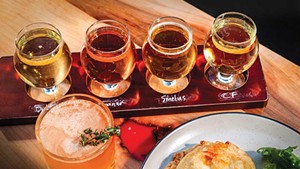
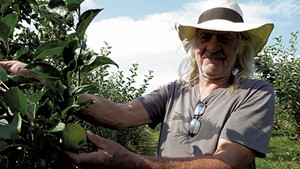







Comments
Comments are closed.
From 2014-2020, Seven Days allowed readers to comment on all stories posted on our website. While we've appreciated the suggestions and insights, right now Seven Days is prioritizing our core mission — producing high-quality, responsible local journalism — over moderating online debates between readers.
To criticize, correct or praise our reporting, please send us a letter to the editor or send us a tip. We’ll check it out and report the results.
Online comments may return when we have better tech tools for managing them. Thanks for reading.